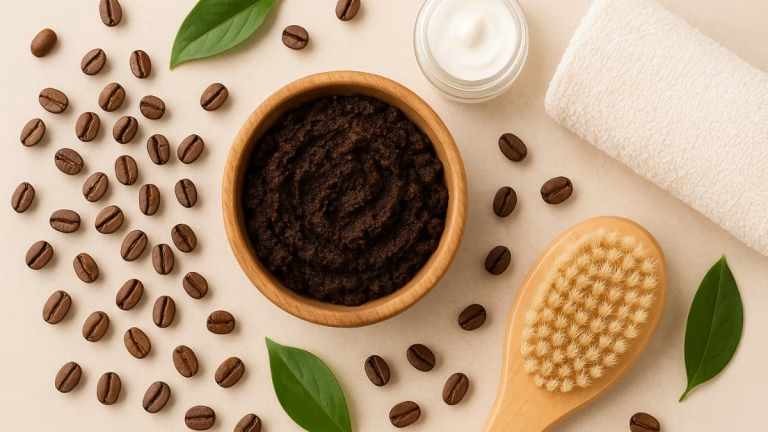
Imagine this: you wake up, stumble into the kitchen, and crave a bold cup of coffee that gives you a comforting hug in the morning. That’s often where organic dark roast coffee steps into the spotlight. Dark roasts have a reputation for depth and richness. Still, when you add the organic factor, you get something that’s not just robust, but also carefully cultivated for quality and environmental friendliness.
How does this roast category differ from medium or light roasts. At a basic level, dark roast beans are roasted longer, which leads to deeper color, lower acidity, and a more pronounced aroma. Some people describe it as smoky or chocolatey, while others simply call it “intense.” However, it’s not all about the taste. Numerous factors, like bean origin and roasting process, shape the coffee’s final notes.
Getting comfortable with roast levels
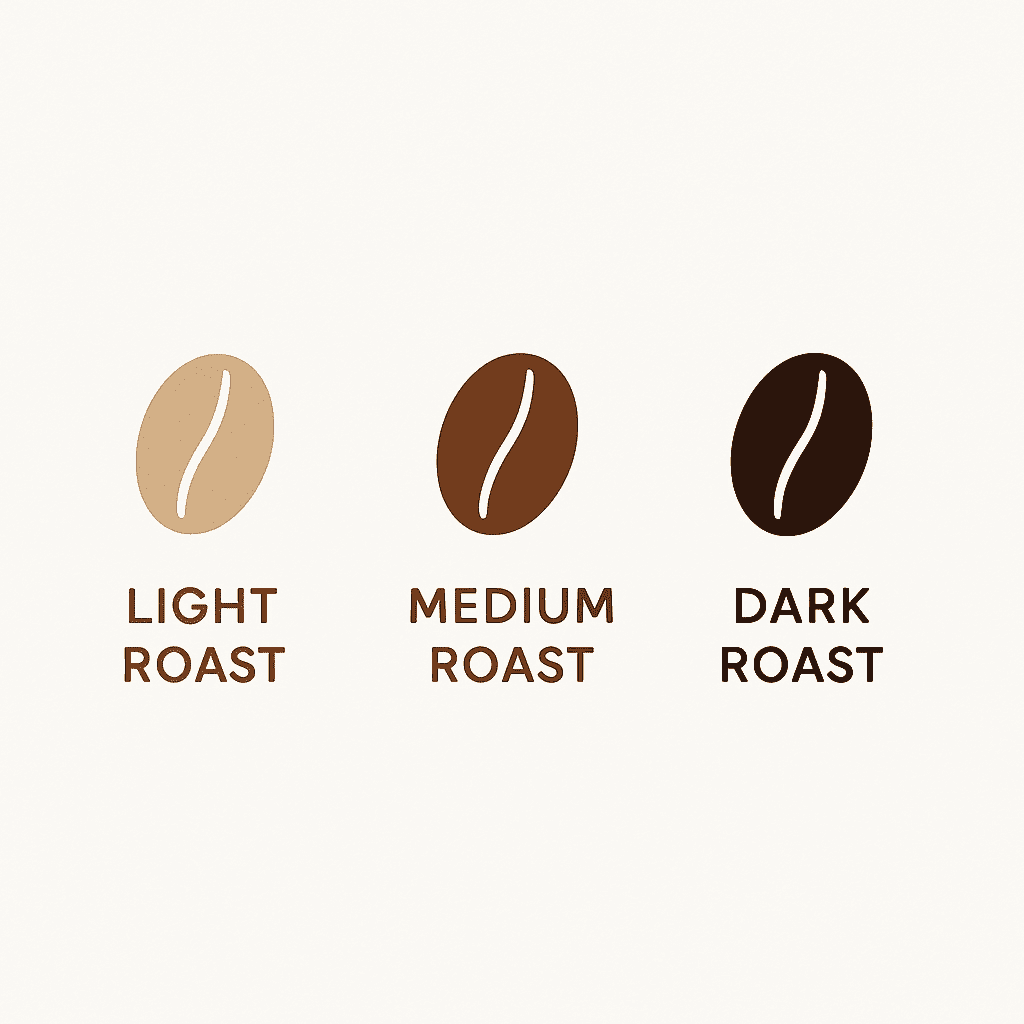
Roast Levels Comparison
Because organic dark roast coffee involves beans grown without synthetic fertilizers or pesticides, you’re getting a final product that pays more respect to both your health and the environment. Think of it like buying organic produce at a farmers’ market: the priority is quality and cleaner cultivation. For dark roast lovers, this means you can enjoy your strong morning pick-me-up without worrying about extra chemicals lurking in your cup.
Dark roast coffees also fit well with a variety of brewing methods. From drip coffee machines to espresso shots, the heavier flavors can stand up to milk, cream, or a sweetener if that’s your usual go-to. So you’re free to customize—and that’s part of the charm. It’s like having a cozy, layered sweater you can dress up or down. That’s the flexibility and warmth of a good dark roast.
See why organic matters
Do you ever pause to consider what goes into your coffee before it reaches your mug? When it comes to organic dark roast coffee, the beans aren’t just roasted carefully; they’re grown with environmental stewardship and sustainability in mind. Organic farms avoid synthetic pesticides and chemical fertilizers, focusing on responsible land management instead. For you, that typically means fewer additives in your brew.
Farming with an eco-friendly ethos
Most organic coffee farms use shade-grown practices. This means planting coffee trees beneath a canopy of larger trees that protect the delicate beans, support natural pest control, and preserve biodiversity. By letting birds and other wildlife coexist with the coffee plants, farmers often rely less on artificial means of pest control. It’s a holistic approach that reduces toxins that might otherwise run off into local water supplies.
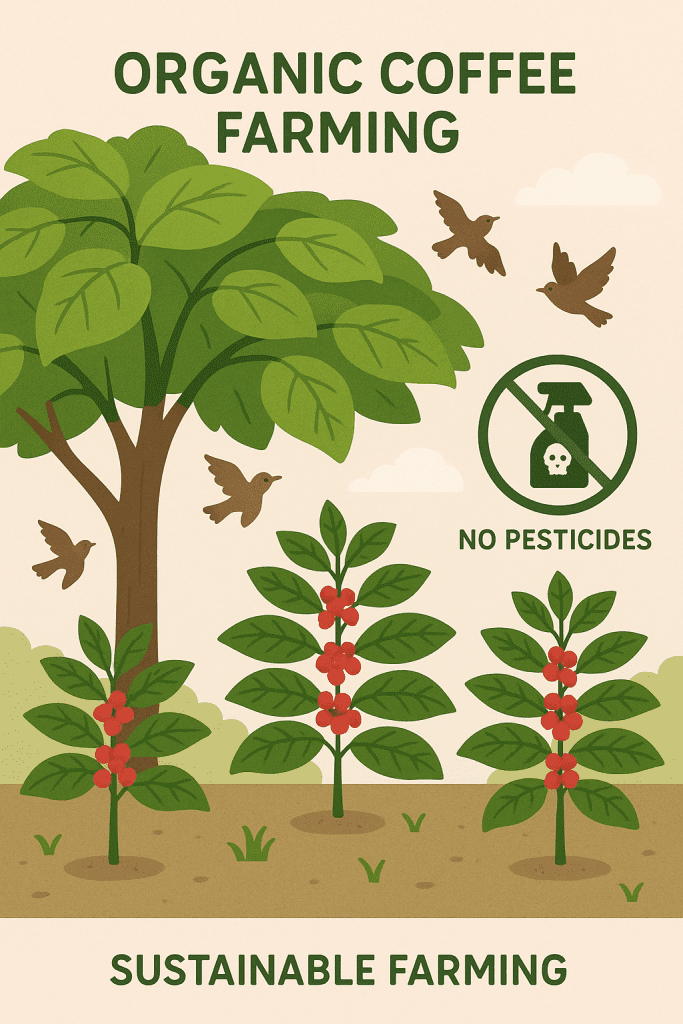
Organic Farming Practices
Another bonus is how organic farming methods can maintain the surrounding community’s well-being. Local farming families who cultivate organic beans tend to encounter fewer chemicals in their daily lives. This can lead to healthier local ecosystems and a reduced health risk for people who work on or live near the coffee plantations.
What does it mean for your cup?
When you choose an organic dark roast, you’re not just picking a flavor profile. You’re also making a small statement about farming ethics and environmental awareness. That cup in your hand represents a chain of thoughtful choices, from careful planting to meticulous roasting. Sure, it might cost a bit more than a standard bag of beans, but if you’re committed to a cleaner brew and a more sustainable planet, it’s often worth the investment.
Organic coffee can also taste cleaner or smoother. Since the beans aren’t exposed to chemical residues, many people find that the roasty notes in their dark brew feel more authentic. Instead of picking up hints of anything artificial, you get that distinct, smoky edge that lingers in a tasty, textured way on your tongue.
Appreciate the flavor profile
To truly appreciate organic dark roast coffee, it’s essential to understand how flavor develops during the roasting process. As the beans roast, their natural sugars caramelize, creating those distinct chocolate or toffee undertones. The higher heat associated with dark roasts brings a bolder presence, often described as bittersweet, akin to semi-dark chocolate. This unique flavor profile is sure to intrigue and excite your taste buds.
A quick flavor comparison
Below is a handy table to highlight how roast levels can change flavor, notes, and caffeine content:
| Roast Level | Flavor Snapshot | Common Tasting Notes | Approx. Caffeine per 8 oz |
| Light | Bright, tangy, acidic | Fruity, floral, sometimes nutty | ~95-100 mg |
| Medium | Balanced, sweet, round | Toasted nuts, slight caramel | ~90-95 mg |
| Dark | Bold, roasty, bittersweet | Dark chocolate, smoky, often less acidic | ~85-90 mg |
In a dark roast, some of the origin flavors that you might detect in a lighter roast become subdued. This doesn’t necessarily mean the coffee is of lesser quality. Instead, it indicates that the roasting process is highlighting different compounds. It’s like cooking vegetables: a quick sauté might preserve a fresh, crisp taste, while a longer roast in the oven yields sweeter, more caramel-like flavors.
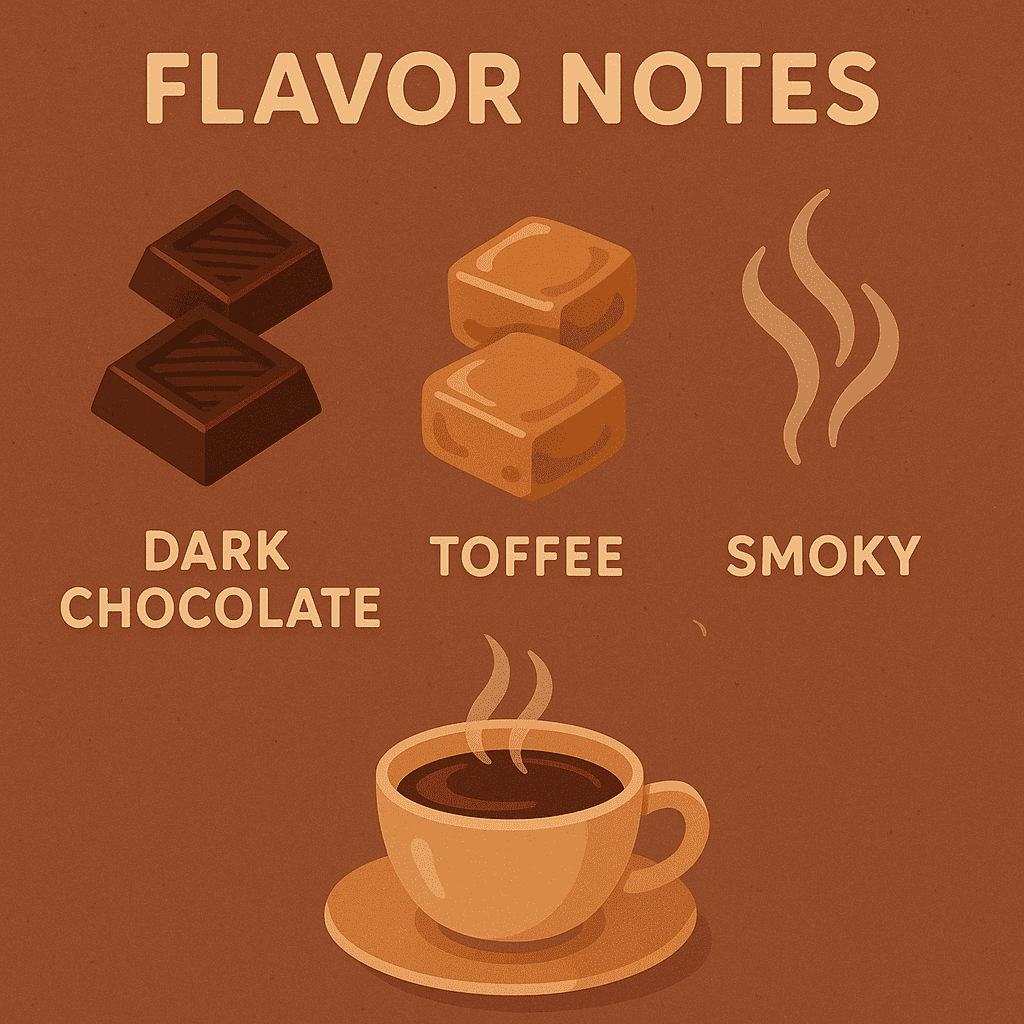
Dark Roast Flavor Profile
Tasting tips
The true beauty of organic dark roast coffee lies in how it balances its hearty profile with subtle sweetness. That’s why so many coffee-lovers keep a bag of dark roast on hand—sometimes you crave that cozy, roasty intensity that almost makes you feel like you’re in a rustic cafe somewhere, taking a peaceful morning pause.
Boost your health naturally
Many coffee drinkers appreciate a dark roast for its classic, smoky punch. However, it’s important to note that organic dark roast coffee can also contribute to your overall well-being. While coffee isn’t a cure-all, it does offer some health benefits that can complement an active, healthy lifestyle, providing you with a sense of reassurance and confidence in your choice.
Antioxidants and more
Coffee in general is a surprisingly decent source of antioxidants (compounds that help combat cell damage). Dark roasts, in particular, retain antioxidants even though they’re roasted longer. One antioxidant commonly discussed is chlorogenic acid, although its levels can vary between different beans and roast durations. By choosing organically grown dark coffee, you potentially lower your exposure to synthetic chemicals and, in theory, preserve more of the beans’ natural goodness.

Health Benefits Overview
This brew can also help you feel more alert, courtesy of moderate caffeine content. If you’re trying to power through a study session or jump-start your day at the office, a dark roast might deliver a sustained boost. Keep in mind that caffeine sensitivity differs from person to person. If you notice jitters or trouble sleeping, consider reducing your coffee intake or limiting it to earlier in the day.
Potential protective roles
Some emerging studies point to coffee’s possible roles in heart health and metabolic support. Researchers have found associations between moderate coffee consumption and a reduced risk of certain chronic conditions. It’s essential, though, to distinguish correlation from causation. Factors like your overall diet, exercise habits, and family health history all play a big part in shaping your well-being.
A final note: watch what you add to your coffee. Creamers packed with sugar or artificial flavors can offset the potential health benefits of your brew. A dash of milk or a drizzle of honey may be more balanced choices if you still want some sweetness. Alternatively, try your dark roast black. Yes, it’s a strong flavor, but it also comes without the extra calories or artificial ingredients. Over time, you might find you prefer the richer taste of unadorned coffee.
Master your brewing technique
So you’ve decided that organic dark roast coffee is your new go-to. The next step is to ensure that every cup reaches its full potential. Brewing isn’t rocket science, but minor tweaks can dramatically change the flavor and quality. Think of it like following a recipe: fresh ingredients, the proper ratios, and consistent timing go a long way.
Drip coffee method
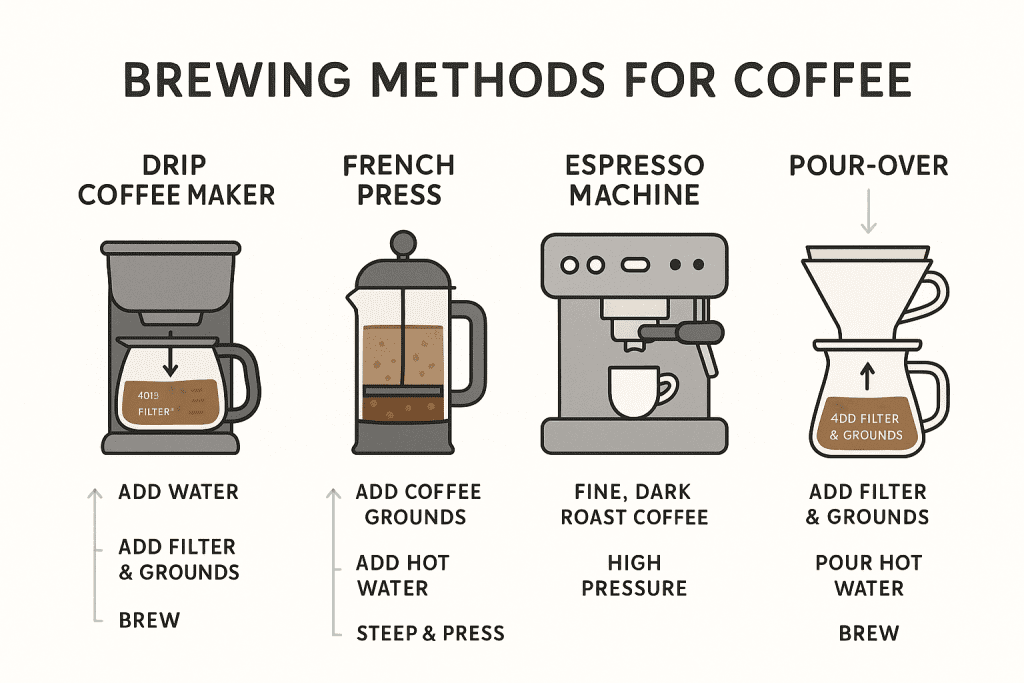
Brewing Methods Guide
French press approach
The French press can bring out a heavier body, which pairs nicely with a bold roast.
Espresso and cold brew
The goal is to find a method that aligns with your taste buds and your schedule. Sometimes you’ll want a quick drip coffee before running out the door. Other times, you might savor the ritual of prepping a French press. Both can do justice to a well-chosen organic dark roast coffee.
Choose beans with confidence
The coffee aisle can be overwhelming: so many labels, roasteries, and flavor descriptions. How do you pick the proper organic dark roast coffee for you? Start by scanning for certifications like USDA Organic or Rainforest Alliance, which confirm specific standards for farming and production. Look at the roast date too. Fresher is typically better, so aim to brew your beans within a few weeks of their roast date.
Reading labels and origins
Coffee beans originate from various regions, including Central America, Africa, and Southeast Asia. Each area can impart subtle differences in taste.
These characteristics won’t be as pronounced in a dark roast as in lighter roasts, but they can still influence the overall flavor. If you find a bean with origins you enjoy in lighter roasts, sampling the exact origin in a dark roast might offer a new perspective.
Where to buy
You can pick up organic dark roast coffee at specialty grocery stores, roaster cafes, or online shops. For a strong sense of transparency, some roasters include details about their relationship with coffee farmers, the farm’s elevation, and other interesting tidbits on the packaging or their website. Reading these details can heighten your appreciation for the coffee as you brew it.
Storing your beans
Once you bring your beans home, keep them in an airtight container in a cool, dry place (not the refrigerator). Oxygen, moisture, and heat are the enemies of coffee freshness. If you prefer pre-ground coffee for convenience, you can still enjoy a decent cup, though you’ll lose a bit of that freshly ground aromatic punch. If possible, invest in a small burr grinder and grind just before brewing. The difference in flavor is often remarkable.
Wrap up and next steps
When it comes down to it, organic dark roast coffee offers a rewarding combination of rich, roasty flavor and mindful cultivation. You get a coffee that can taste delicious on its own, whether brewed via drip, French press, or espresso machine. Meanwhile, the organic label represents a sustainable effort—fewer chemicals for the environment and a cleaner bean for your cup.
By starting your day with an organic dark roast, you tap into a flavor profile that stands out for its boldness. Maybe you’ll enjoy it black, relishing a bittersweet complexity. Or perhaps you’ll perk it up with a splash of cream or a pinch of cinnamon. Either way, you’ll know you’re part of a chain that values ethical farming, quality control, and the simple pleasure of a well-crafted brew.
Ready to experiment further? Try changing your grind size or switching brewing methods to see how your favorite roast evolves. Think about exploring single-origin organic beans from different parts of the world, noting how each region’s climate and soil produce subtle taste variations. The wonderful thing about coffee is that there’s always a new flavor or nuance to discover.
And if you have a few moments in the morning, linger over your dark roast’s aroma. Enjoy that strong, warming fragrance as you mentally prepare for the day. Because sometimes, a heartfelt sip of a carefully chosen coffee can do more than energize you; it can add a small spark of delight that carries through the rest of your routine. Cheers to finding your perfect cup.


